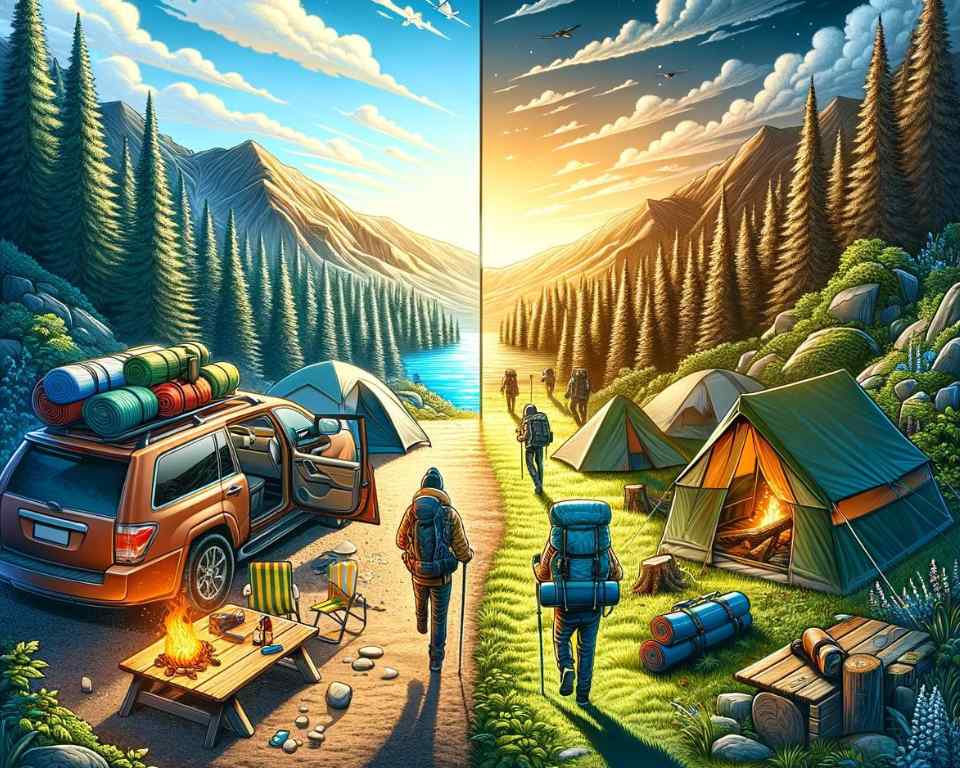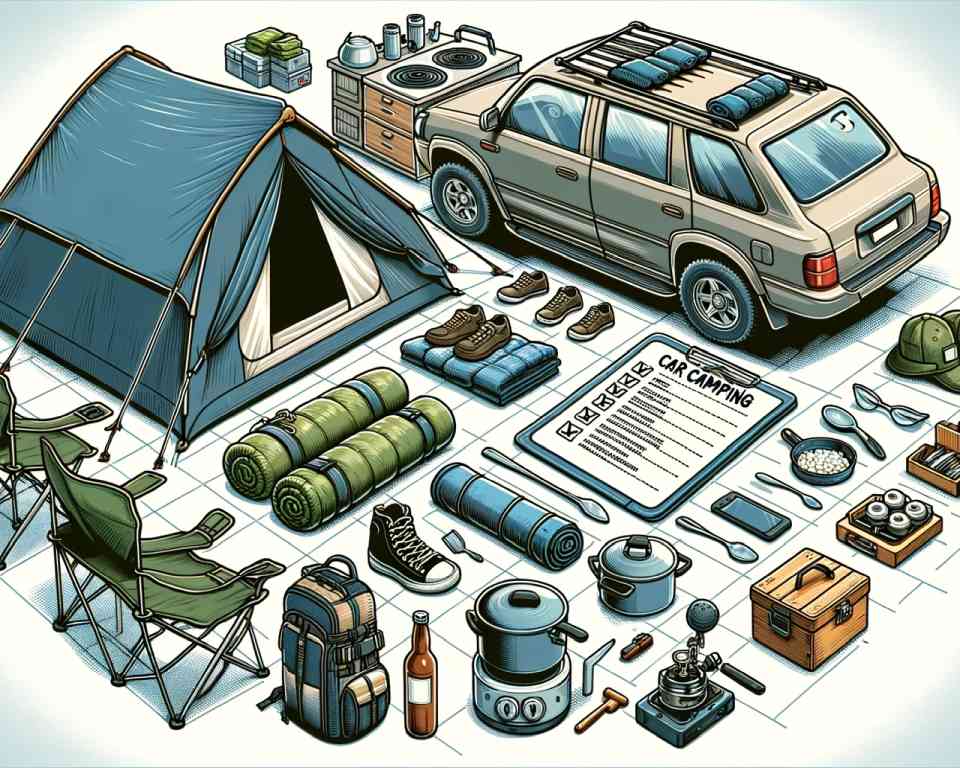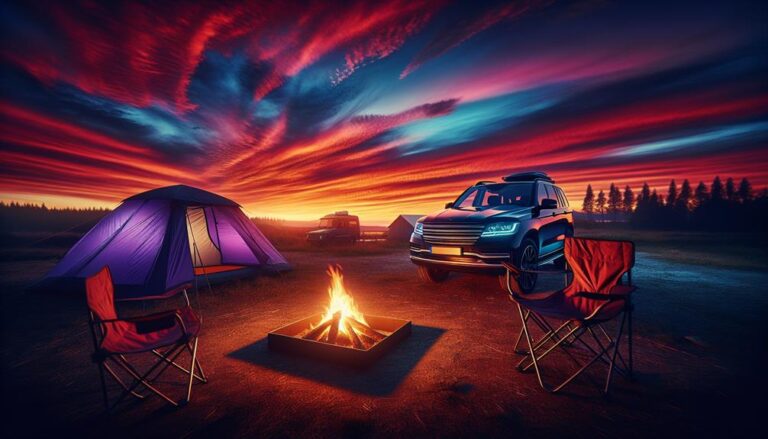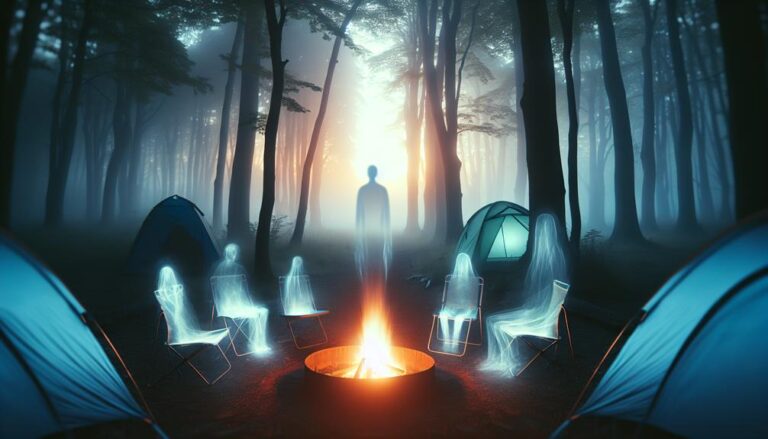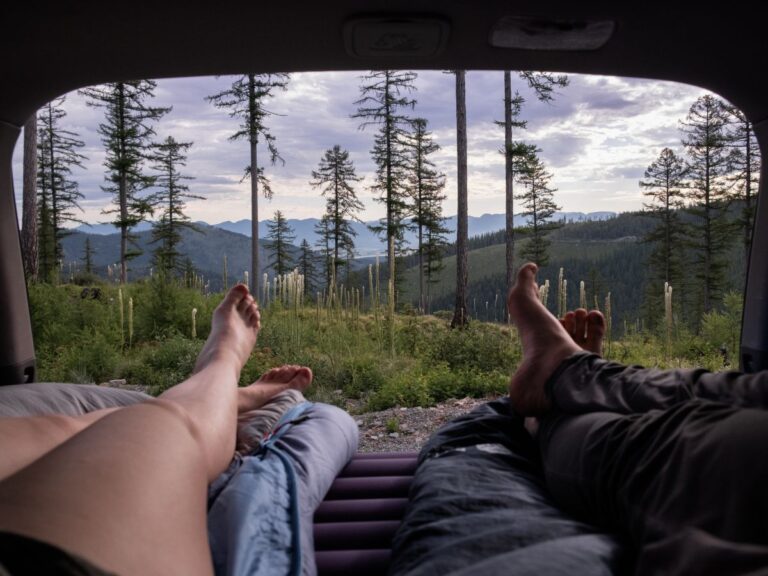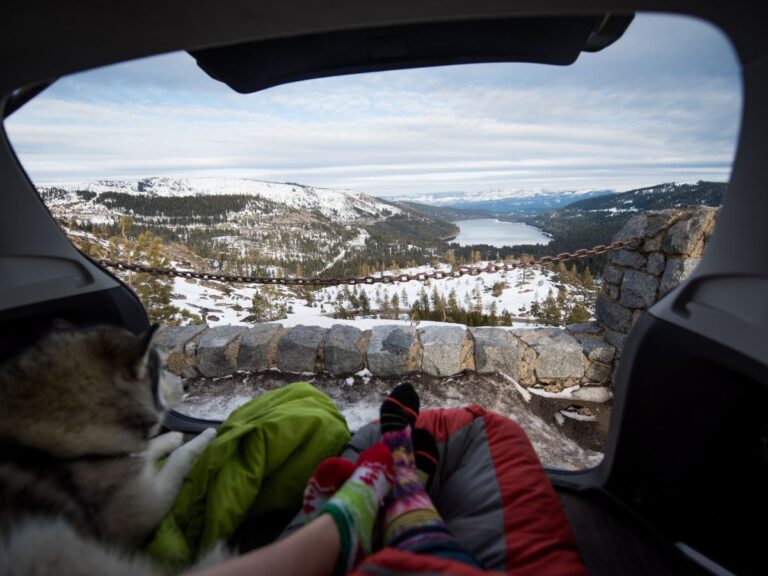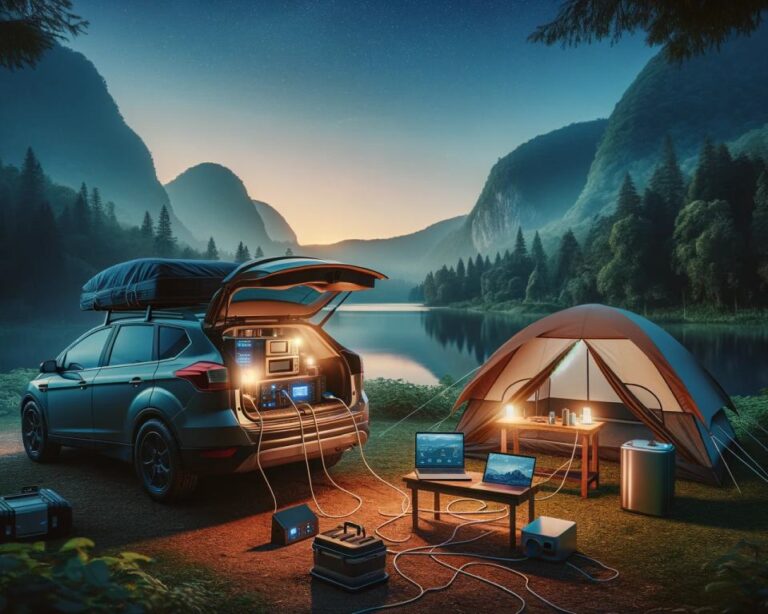Comparing Car Camping and Backpacking: Choosing Your Outdoor Adventure
When it comes to experiencing the great outdoors, there are two popular options: car camping and backpacking. These outdoor adventures offer unique experiences and challenges, allowing you to connect with nature in different ways. Deciding between car camping and backpacking depends on your preferences, the level of immersion you seek, and the camping gear you have. Let’s explore the differences between the two and help you choose the perfect outdoor adventure for you.
Car camping offers convenience and accessibility. With your vehicle as your home base, you can drive directly to your campsite, bringing along camping gear, cooking equipment, and other amenities. Car camping is ideal for those who value comfort and want to bring along more supplies for a relaxing and enjoyable camping experience. Whether you’re a family with young children or a group of friends looking to unwind, car camping provides a great outdoor adventure with the convenience of modern comforts.
On the other hand, backpacking is for those seeking a more immersive and challenging outdoor adventure. This activity involves carrying all your essentials on your back and venturing into the wilderness, where you rely on your skills and strategic packing to survive. Backpacking allows you to explore remote and breathtaking camping destinations that are inaccessible by car. It offers a sense of self-reliance, adventure, and a deeper connection with nature as you hike and camp amidst stunning landscapes.
Choosing between car camping and backpacking is a matter of personal preference and the type of outdoor experience you desire. If you value convenience and the ability to bring more gear, car camping may be the right choice for you. On the other hand, if you crave adventure, challenge, and a closer connection with nature, backpacking could be your ideal outdoor adventure. Whichever option you choose, make sure to pack the necessary camping essentials and prepare for an unforgettable experience in the great outdoors.
Experience the Outdoors
The great outdoors offers a plethora of experiences, from tranquil moments to thrilling challenges. Whether you seek tranquility, adrenaline-fueled adventures, or a chance to connect with nature, there is an outdoor activity for everyone. It’s important to consider the level of preparation, effort, and intensity required for each activity to choose the one that resonates with your soul.
Engaging in outdoor experiences allows us to escape the confines of our everyday lives and immerse ourselves in the beauty and wonders of nature. From hiking through lush forests to kayaking along pristine rivers, the outdoor world offers endless opportunities for exploration and discovery.
For those seeking peace and serenity, activities such as nature walks or birdwatching provide a calming connection with the natural environment. The gentle sounds of rustling leaves and chirping birds create a soothing symphony that lulls us into a state of pure tranquility.
On the other hand, if you crave excitement and adventure, outdoor activities like rock climbing or white-water rafting will get your heart racing and adrenaline pumping. These thrilling adventures push us to our limits, challenging our physical and mental boundaries while providing a rush of pure exhilaration.
Connecting with nature through outdoor adventures not only invigorates our senses but also nourishes our mind, body, and spirit. It allows us to escape the noise and distractions of modern life and reconnect with our primal instincts.
Outdoor exploration fosters a sense of awe and wonder as we witness breathtaking landscapes, stunning sunsets, and star-studded night skies. It reminds us of the vastness of the natural world and reawakens our appreciation for its beauty and diversity.
Whether you prefer the solitude of solo adventures or the camaraderie of group activities, outdoor experiences provide opportunities for personal growth, self-discovery, and bonding with like-minded individuals. They allow us to forge lasting memories and create stories to be shared around the campfire.
So, whether you are hiking through a picturesque trail, camping under a sky full of stars, or embarking on a daring wilderness expedition, the great outdoors awaits, ready to offer you an unforgettable experience. Step outside, connect with nature, and embark on your own outdoor adventure.
Backpacking vs Camping
Are you ready to step into the great outdoors and embark on an unforgettable adventure? When it comes to outdoor pursuits, backpacking and camping are two popular options. Both offer unique experiences and opportunities to connect with nature, but there are important differences to consider. Let’s explore the world of backpacking and camping to help you choose the right adventure for you.
Backpacking: Embrace Self-Sufficiency and Strategic Packing
Backpacking is all about self-sufficiency and immersing yourself in the wilderness. It involves carrying your essentials, including camping gear, food, and supplies, on your back as you venture into nature’s embrace. Strategic packing becomes essential, as you’ll need to maximize space and weight without compromising on necessities. As a backpacker, you’ll learn to prioritize what’s truly important, honing your survival skills and connecting with the natural environment on a deeper level.
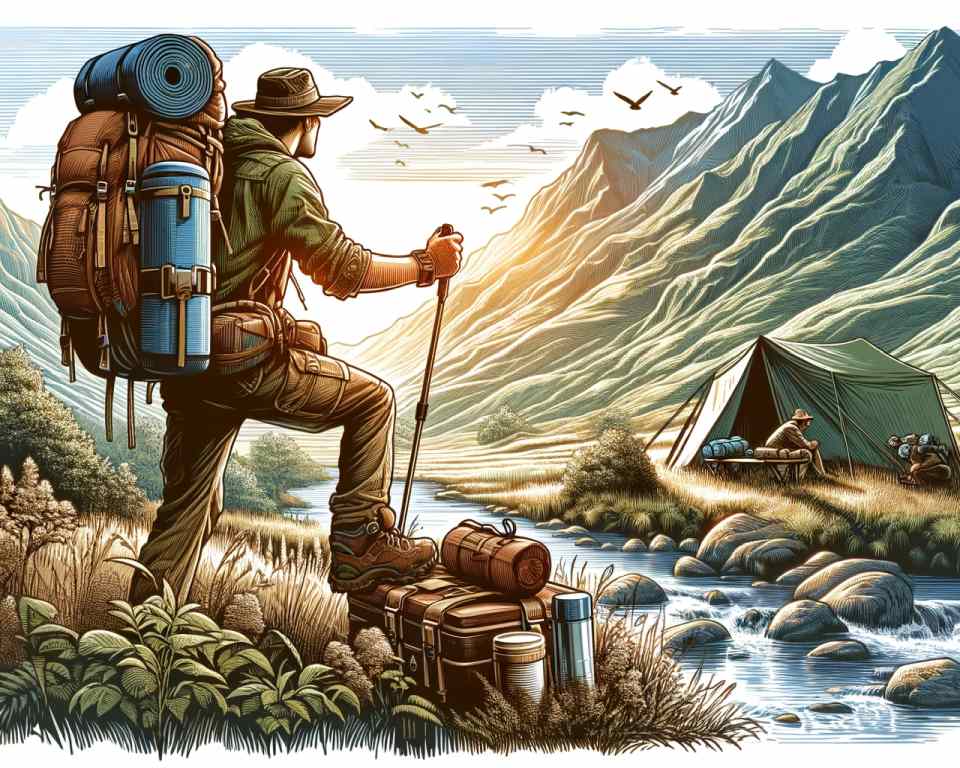
Camping: Embrace Comfort and Amenities
On the other hand, camping offers a more comfortable and leisurely experience. When camping, you typically set up your base camp in established campgrounds, complete with amenities like picnic tables, fire pits, and restroom facilities. This allows you to bring more gear and amenities, such as comfortable sleeping arrangements and cooking equipment. Camping is perfect for those who value a balance between outdoor adventure and modern conveniences.
It’s worth noting that backpacking often entails camping, as spending the night in the serenity of nature is an integral part of the backpacking experience. So, while backpacking promotes self-sufficiency and strategic packing, camping adds an extra layer of comfort and amenities to enhance your outdoor adventure.
Choosing Between Backpacking and Camping
When making your decision, consider the level of comfort and self-sufficiency you desire. Are you looking for a challenging expedition that tests your limits, or do you prefer a leisurely escape with modern amenities? Are you ready to carry all your essentials on your back, or would you rather set up a cozy campsite near your vehicle? Think about your preferences, goals, and the type of experience you want to create. Both backpacking and camping offer unique adventures, so the choice ultimately comes down to your individual style and outdoor ambitions.
Now that you have a better understanding of backpacking and camping, it’s time to take the next step on your outdoor journey. Whether you seek rugged trails, picturesque campsites, or a combination of both, the great outdoors awaits. So pack your gear, lace up your boots, and answer nature’s call as you embark on your chosen adventure.
Camping Tent vs Backpacking Tent
When it comes to choosing a tent for your outdoor adventure, it’s important to consider whether a camping tent or a backpacking tent would be the best fit for your needs. Each type of tent has its own unique features and benefits that cater to different camping experiences.
Camping Tents: Spaciousness and Comfort
Camping tents are designed with spaciousness in mind, making them ideal for larger groups or families. These tents provide ample room for multiple occupants, as well as space to store gear and move around comfortably. With their larger size, camping tents often include separate living areas, dividers, and multiple entrances, creating a more home-like environment while camping.
Backpacking Tents: Portability and Durability
On the other hand, backpacking tents prioritize portability and durability to meet the demands of solo or small-group adventures. These tents are designed with lightweight materials and compact designs, allowing backpackers to easily carry them in their packs while hiking. Despite their lightweight construction, backpacking tents are built to withstand the rigors of the trail, offering the durability needed for extended use in rugged outdoor environments.
Weather Resistance and Lightweight Design
Both camping tents and backpacking tents are designed to provide weather resistance, ensuring that you stay dry and protected from the elements. However, backpacking tents often feature specialized designs and materials that prioritize weatherproofing, such as reinforced seams, waterproof coatings, and sturdy rainflys. These features make backpacking tents better equipped to handle unexpected weather conditions, keeping you dry and comfortable during your outdoor adventures.
In addition to their weather resistance, backpacking tents also excel in their lightweight design. Every ounce matters when you’re carrying your gear on your back, and backpacking tents are carefully designed to minimize weight while still providing the necessary shelter and protection. Their lightweight design ensures that you can easily pack and transport your tent without adding unnecessary weight to your load.
In summary, camping tents focus on spaciousness and comfort, offering room for larger groups and families to relax and enjoy their camping experience. Backpacking tents, on the other hand, prioritize portability, durability, weather resistance, and lightweight design, making them perfect for solo or small-group adventures where weight and efficiency are crucial.
What is Car Camping?
Car camping is a popular outdoor activity that combines convenience with the excitement of camping. With car camping, you have the freedom to drive to a designated campsite and set up your gear near your vehicle. This means you can bring along more equipment and supplies, making it perfect for those who value comfort and modern amenities while still experiencing the beauty of nature.
When you go car camping, you can pack everything you need in your car, from spacious tents and cozy sleeping bags to camping chairs and cooking gear. You’ll have the convenience of bringing along comfortable bedding, coolers filled with your favorite food and drinks, and other equipment that adds to the enjoyment of your trip.
One of the advantages of car camping is being able to choose from a variety of designated campsites. These campsites often offer modern amenities such as bathrooms, picnic tables, fire pits, and sometimes even electricity. This ensures that you have access to the facilities and resources you need for a comfortable and hassle-free camping experience.
Car camping also allows you to explore different camping destinations without the need for long hikes or carrying heavy backpacks. You can easily drive to stunning locations and set up camp to enjoy the surrounding natural beauty. Whether you prefer a peaceful lakeside retreat or a picturesque mountain setting, car camping provides the flexibility to choose your ideal camping spot.
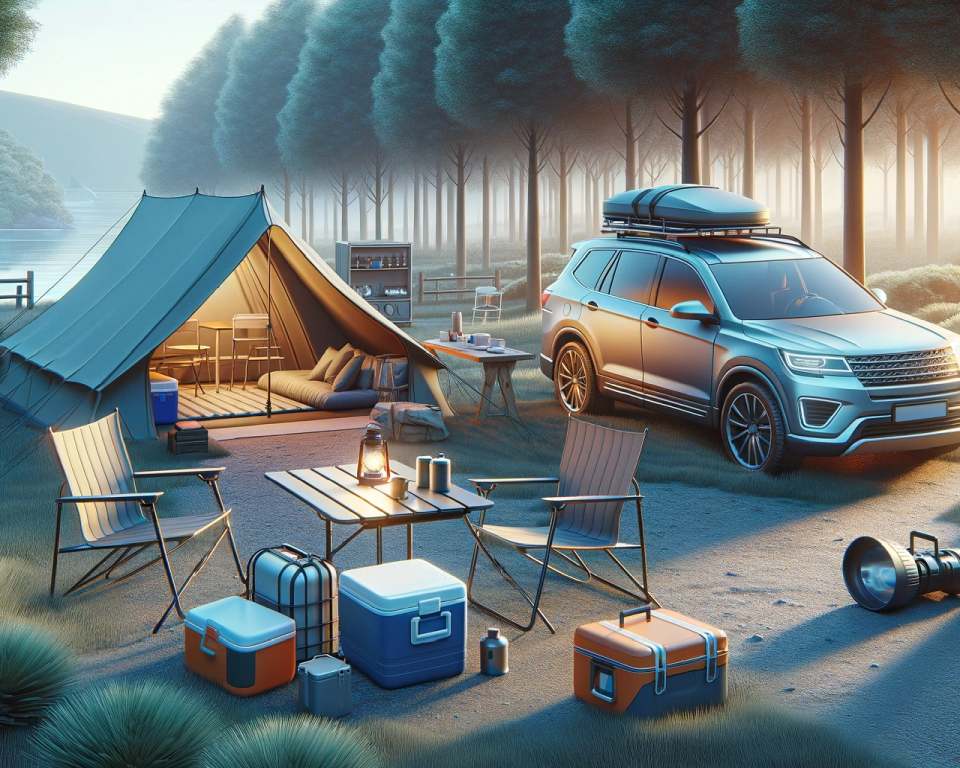
Car camping is a fantastic way to enjoy the great outdoors with added convenience and comfort. It’s the perfect option for families, friends, or even solo adventurers who want to experience nature without compromising on modern amenities. So pack your gear, load up your car, and embark on a memorable car camping adventure!
Hammock Camping vs Tent Camping
When it comes to camping, there are two popular options that offer unique sleeping experiences: hammock camping and tent camping. Both options have their advantages and it’s important to consider your preferences and requirements for a comfortable and immersive camping experience.
Comfort and Unique Sleeping Experiences
Hammock camping provides unparalleled comfort and versatility. With a hammock, you can sleep off the ground, enjoying the gentle sway and being closer to nature. Hammocks offer excellent back support and allow for a more restful night’s sleep. You can also choose your ideal sleeping position, whether you prefer sleeping on your back, side, or stomach. Hammocks provide a unique sleeping experience that can be incredibly relaxing.
Tent camping, on the other hand, offers a more traditional and protected shelter. Tents provide a cozy and enclosed sleeping space, protecting you from the elements and wildlife. They provide a sense of security and privacy that hammocks may not offer. Tent camping allows you to have a dedicated sleeping area where you can stretch out and create a personalized sleeping environment.
Shelter and Immersion in Nature
Choosing between hammock camping and tent camping also depends on your desire for immersion in nature. Hammock camping allows you to be fully surrounded by nature, as you are suspended between trees and have a wide-open view of your surroundings. You can enjoy the gentle breeze, the sounds of nature, and the possibility of waking up to stunning views. Hammock camping offers a more direct and intimate connection with the natural environment.
Tent camping, on the other hand, provides a designated shelter that can offer protection from rain, wind, and other elements. With a tent, you have a defined and enclosed space where you can retreat from the outside world. This can be particularly advantageous in areas with unpredictable weather conditions. Tent camping allows you to create a cozy and safe haven, providing a sense of comfort and reassurance.
“Hammock camping offers unparalleled comfort and immersion in nature, while tent camping provides a more traditional and protected shelter.”
Choosing Your Camping Experience
Ultimately, the choice between hammock camping and tent camping comes down to personal preference. If you prioritize comfort, versatility, and a close connection with nature, hammock camping may be the ideal choice for you. On the other hand, if you prefer a more traditional camping setup with a dedicated shelter, protection from the elements, and a sense of security, tent camping may be the better option.
Consider factors such as your destination, weather conditions, desired level of comfort, and the overall camping experience you want to have. Whether you choose to sleep off the ground in a cozy hammock or snuggle up inside a tent, both options offer the opportunity to enjoy the great outdoors and create unforgettable camping memories.
Table: Comparison of Hammock Camping and Tent Camping
- Hammock Camping:
- Provides unmatched comfort and back support
- Allows for a unique sleeping experience off the ground
- Offers a close connection with nature and stunning views
- Requires trees or suitable supports for setup
- Tent Camping:
- Offers a traditional and protected shelter
- Provides a sense of security and privacy
- Protects from the elements and wildlife
- Requires a designated camping area and tent setup
What is Day Camping?
Day camping, also known as day hiking, offers a thrilling way to immerse yourself in nature without the commitment of an overnight stay. It provides the opportunity to explore scenic trails and witness breathtaking views, all while engaging in invigorating physical activity. Day camping allows you to experience the beauty of the great outdoors and return to the comforts of civilization at night.
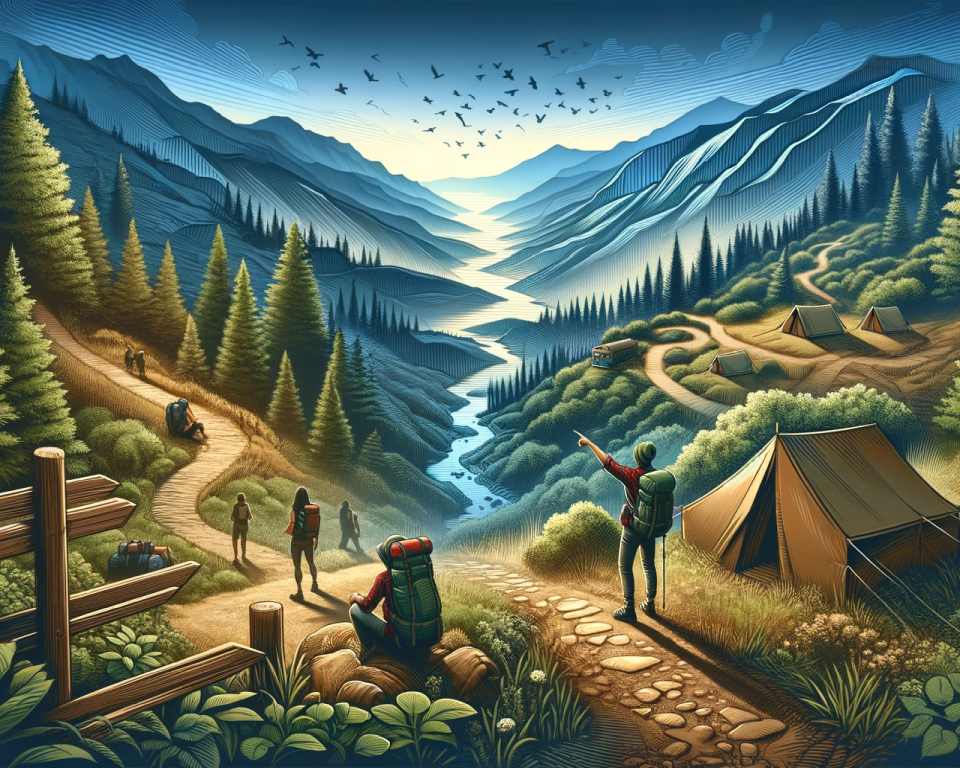
Unlike traditional camping, day camping does not require an overnight stay. It involves embarking on scenic hikes and walks during the day, allowing you to bask in the serenity of nature without the need for camping gear or setting up a campsite. You can savor the flexibility of spending the day surrounded by awe-inspiring landscapes and return to the comfort of your own bed in the evening.
This form of camping is perfect for those who enjoy hiking and exploring new trails while seeking the excitement of varying terrains and breathtaking vistas. Day camping offers a range of options, from leisurely strolls through meadows to challenging hikes up steep mountain slopes.
By engaging in day camping, you have the freedom to customize your adventures and enjoy the flexibility of returning home each night. It is a fantastic way to pursue your passion for the outdoors while maintaining the comfort and convenience of an overnight stay. Whether you are a seasoned hiker or a beginner looking for a taste of the outdoors, day camping provides a rewarding and fulfilling experience.
So pack your hiking boots, grab your backpack, and embark on a day camping adventure to explore the wonders of nature, enjoy breathtaking views, and partake in invigorating physical activity. Experience the thrill and beauty of the great outdoors, all within the span of a single day.
Hiking vs Backpacking
Hiking and backpacking are two popular ways to explore the great outdoors. While they share similarities, they offer different levels of adventure and immersion in nature.
Hiking involves shorter journeys on well-established trails, making it an accessible activity for nature enthusiasts of all levels. Whether it’s a leisurely walk in the park or a challenging trek up a mountain, hiking allows you to connect with nature, enjoy breathtaking views, and engage in invigorating physical activity. With minimal gear requirements and simple preparation, hiking is a great option for those looking to embark on a quick outdoor adventure.
Backpacking, on the other hand, takes outdoor exploration to the next level. It involves venturing into the wilderness, often traversing rugged terrain and tackling challenging trails. Backpacking requires greater self-reliance, as you carry all your essential gear and supplies on your back, including shelter, food, and water. This level of self-sufficiency allows for extended expeditions into remote areas, providing a deeper immersion in nature and the thrill of conquering uncharted territories.
Backpacking is ideal for those who seek to push their limits, explore untouched landscapes, and experience the rewards of self-reliance. It offers a unique opportunity to disconnect from the modern world and challenge oneself physically and mentally. It also allows for a closer connection with nature, as you spend more time in untouched wilderness and encounter a wide variety of ecosystems and wildlife.
Whether you choose hiking or backpacking, both activities offer incredible opportunities to explore the beauty of nature and discover your own limits. So grab your gear, lace up your boots, and embark on an outdoor adventure that suits your preferences and aspirations.
Mountaineering vs Backpacking
Mountaineering and backpacking are both thrilling outdoor pursuits that offer unique challenges and experiences. While backpacking allows us to immerse ourselves in the wilderness, mountaineering takes it to a whole new level by conquering high-altitude peaks and testing our technical expertise, physical endurance, and mental strength.
Mountaineering involves scaling mountains, often reaching heights where the air becomes thin, and specialized equipment becomes essential. The journey to the top requires a combination of technical skills, physical fitness, and mental resilience. It’s a true test of our abilities, pushing us beyond the limits we thought possible.
“Mountaineering is not just about reaching the summit; it’s about the journey, the challenges, and the sense of accomplishment that comes from pushing ourselves to new heights,” says renowned mountaineer, Alex Honnold.
Backpacking, on the other hand, focuses on trekking through diverse terrains and immersing ourselves in nature’s beauty. While it requires physical and mental endurance, it offers a different kind of adventure. Backpacking allows us to explore remote landscapes, camp under starlit skies, and discover hidden treasures along the way.
However, mountaineering takes backpacking to the next level by incorporating technical skills and the pursuit of high-altitude peaks. It demands meticulous planning, experience, and a deep understanding of the mountains and their challenges. From glacier crossings to navigating dangerous slopes, mountaineering requires us to develop our technical expertise and conquer our fears.
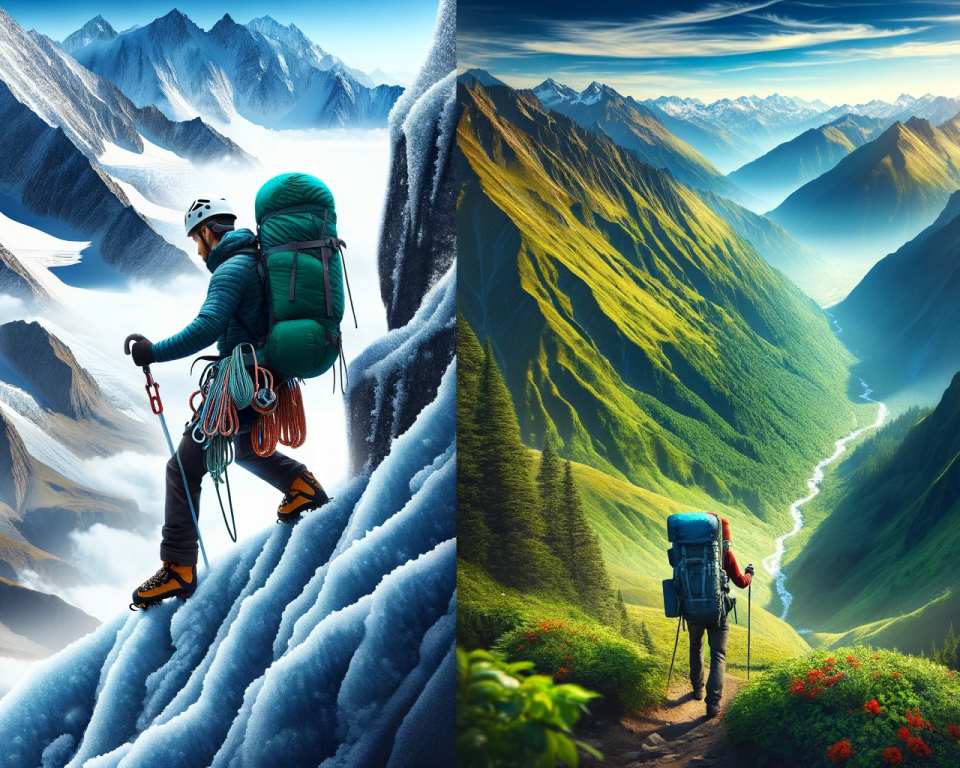
Whether we choose backpacking or mountaineering, both activities push our physical and mental boundaries, teaching us invaluable life lessons. They offer a sense of accomplishment, a deeper connection with nature, and an appreciation for the strength and resilience within us.
Benefits of Backpacking
Backpacking offers a multitude of benefits that contribute to our physical and mental well-being, personal growth, and connection with nature and others. It provides an unparalleled adventure and exploration experience while allowing us to disconnect from the demands of modern life.
Enhanced Physical and Mental Health
Engaging in backpacking activities offers tremendous benefits for our physical health. The strenuous hikes and challenging terrains promote cardiovascular fitness, muscular endurance, and improved overall strength. The combination of physical exertion and exposure to nature boosts our immune system and enhances our overall well-being.
Moreover, backpacking is a fantastic way to prioritize our mental health. It allows us to disconnect from the stresses of daily life, providing a space for solitude and self-reflection. The serene environment and immersion in nature have a calming effect, reducing anxiety and improving our mental clarity and focus.
Personal Growth and Development
Backpacking presents a unique opportunity for personal growth and development. The challenges and demands of backpacking promote resilience, problem-solving skills, and adaptability. We learn to overcome obstacles and push our limits, developing a sense of self-confidence and self-reliance.
Additionally, backpacking encourages us to step outside our comfort zones and embrace new experiences. It opens doors to self-discovery and self-awareness, allowing us to develop a deeper understanding of ourselves and our capabilities.
Connection with Nature and Others
One of the most profound benefits of backpacking is the deep connection it fosters with the natural world. As we trek through vast landscapes, sleep under the starry sky, and witness breathtaking vistas, we develop a profound appreciation for the beauty and fragility of nature.
Furthermore, backpacking often provides opportunities to connect with like-minded individuals and create lifelong friendships. Sharing the challenges and triumphs of the journey brings people together, fostering a sense of camaraderie and community.
Adventure and Exploration
Backpacking is inherently adventurous. Every trip is a unique adventure filled with exploration and discovery. Whether we are traversing rugged terrains, climbing towering peaks, or navigating through dense forests, backpacking allows us to explore some of the most captivating and remote corners of the world.
Disconnecting from Modern Life
In a world dominated by constant connectivity and technological distractions, backpacking offers a much-needed break from modern life. It provides an opportunity to disconnect from screens, notifications, and the fast-paced demands of society. In the silence of nature, we find solace and rejuvenation, allowing us to return to our daily lives with renewed clarity and perspective.
Overall, backpacking is a transformative experience that nourishes our physical and mental health, facilitates personal growth, deepens our connection with nature and others, ignites a spirit of adventure and exploration, and provides a much-needed escape from the pressures of modern life.
Challenges of Backpacking
Backpacking is an exhilarating outdoor adventure that brings us closer to nature, but it also presents its fair share of challenges. Before embarking on a backpacking trip, it’s important to be aware of the physical demands, discomfort, and potential risks involved.
Physical Demands
Backpacking requires endurance and stamina as we navigate through varied terrains with a heavy pack. Carrying all our essential gear, including food, water, and shelter, can put a strain on our muscles and body. However, with proper training and conditioning, we can build the strength and fitness needed to tackle the physical demands of backpacking.
Discomfort
Living in the wilderness for an extended period means sacrificing some comforts of everyday life. Sleeping on the ground, limited access to personal hygiene facilities, and adapting to changing weather conditions can all contribute to discomfort. However, many backpackers embrace these challenges as part of the adventure and find solace in the simplicity and rawness of nature.
Risk of Injury and Illness
While backpacking, there is always a risk of injuries and illnesses, especially when far from immediate medical assistance. Uneven terrain, slippery trails, and unpredictable weather conditions can increase the chances of accidents. It’s crucial to be mindful of our surroundings, take necessary precautions, and carry a well-stocked first aid kit to address any emergencies.
Exposure to the Elements and Wildlife
Being exposed to the elements is an inevitable part of backpacking. From scorching heat to freezing temperatures, we must be prepared to face extreme weather conditions. Additionally, encountering wildlife, including insects, snakes, or larger animals, can be both thrilling and intimidating. It’s essential to research and understand the wildlife in the area we plan to explore, respect their habitats, and take necessary precautions to ensure our safety.
Although backpacking poses challenges, the rewards of immersing ourselves in nature and the sense of accomplishment make it a truly remarkable experience. As we overcome these hurdles, we build resilience, gain a deeper connection with the natural world, and create memories that last a lifetime.
Gear Checklist for Car Camping
When it comes to car camping, having the right gear and equipment can make a world of difference in your camping experience. To ensure a comfortable and enjoyable trip, here’s a checklist of essential items you’ll need:
Tent: Choose a spacious tent that can accommodate the number of people camping. Look for features like easy setup and good ventilation.
Sleeping Gear: Bring sleeping bags or blankets, pillows, and sleeping pads or air mattresses for a restful night’s sleep.
Cooking Gear: Pack a portable stove or grill, cooking utensils, pots and pans, plates, cups, and eating utensils. Don’t forget to bring a cooler for storing perishable food and drinks.
Clothing: Pack appropriate clothing for various weather conditions, including warm layers, waterproof jackets, hats, and sturdy footwear for outdoor activities.
Miscellaneous Gear: Don’t forget to include items like camping chairs, lanterns or flashlights, a first aid kit, insect repellent, sunscreen, camping towels, and a camping multitool.
By following this comprehensive gear checklist, you can ensure that you have all the necessary equipment for a successful and enjoyable car camping trip. Remember to double-check everything before you hit the road, so you can relax and make the most out of your outdoor adventure.
FAQ
What is the difference between car camping and backpacking?
Car camping is more accessible and convenient, allowing you to drive directly to your campsite and bring more gear. Backpacking involves carrying your essentials on your back and venturing into the wilderness for a more immersive experience.
What are the benefits of backpacking?
Backpacking offers enhanced physical and mental health, personal growth, a deep connection with nature, and adventure and exploration.
What should I consider when choosing between camping and backpacking?
Consider your level of comfort, self-sufficiency, and desire for amenities when choosing between camping and backpacking.
What are the differences between camping tents and backpacking tents?
Camping tents are designed for larger groups and prioritize spaciousness and comfort. Backpacking tents prioritize portability, durability, and weather resistance for solo or small-group adventures.
What is car camping?
Car camping involves driving to a campsite and setting up gear near your vehicle for a convenient and comfortable outdoor experience.
What are the options for sleeping while camping?
You can choose between hammock camping, which offers comfort and immersion in nature, or tent camping, which offers a traditional and protected shelter.
What is day camping?
Day camping, also known as day hiking, allows you to explore nature during the day without the commitment of an overnight stay.
What is the difference between hiking and backpacking?
Hiking involves shorter journeys on established trails with minimal gear, while backpacking takes you further into the wilderness with more self-reliance and a potential for extended expeditions.
What is the difference between mountaineering and backpacking?
Mountaineering involves scaling mountains and high-altitude peaks, often requiring technical expertise and specialized equipment, while backpacking focuses on venturing into the wilderness with a backpack for an immersive outdoor experience.
What are the challenges of backpacking?
Backpacking comes with physical demands, discomfort from carrying a heavy pack, exposure to rugged terrain, and potential risks of injury, illness, and exposure to the elements and wildlife.
What gear do I need for car camping?
You will need a tent, sleeping gear, cooking gear, clothing, and miscellaneous gear for a comfortable and enjoyable car camping trip.

